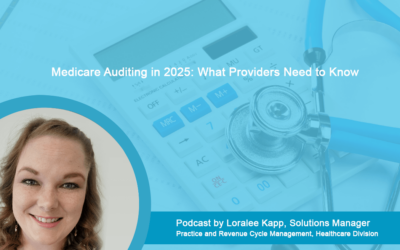Outsource Strategies International (OSI) has years of experience providing comprehensive patient eligibility verification and authorization services for all specialties, including cardiology, physical therapy, and dentistry. Our team can help with all type of insurance claims – No-Fault or Personal Injury Protection, Workers’ Compensation and Liability.
In today’s podcast, Meghann Drella, a Senior Solutions Manager at OSI, discusses: the key points of cardiology verifications of insurance coverage.
Podcast Highlights
01:16 Coverage for Cardiology Services
01:58 What Does Cardiology Insurance Verification Involve?
Read Transcript
Hello and welcome to our podcast series. My name is Meghann Drella and I’m a Senior Solutions Manager here at Outsource Strategies International. Today, I’ll be discussing the cardiology verifications of insurance coverage.
As physicians focus on addressing their patients’ health concerns, they also need to pay attention to the health of their practice’s revenue cycle. Insurance eligibility verification is the first step in revenue cycle management (RCM). When it comes to cardiology conditions, patients need robust health insurance and cardiology practices need focused, comprehensive insurance verification to confirm patients’ coverage for heart disease.
Heart disease is the leading cause of death in the United States. Cardiovascular disease causes one death every 36 seconds and about 659,000 people in the United States die from heart disease each year. Heart disease cost the nation about $363 billion each year from 2016 to 2017.
These statistics from the Centers for Disease Control and Prevention indicate that the growing volume of heart disease fatalities is a major concern for payers. With the passage of the Affordable Care Act (ACA) in 2010, Americans cannot be denied insurance because of a pre-existing condition – including heart defects. Heart disease is one of the costliest chronic diseases for healthcare payers to cover.
01:16 Coverage for Cardiology Services
Cardiology is a discipline where care is provided by multispecialty team that includes a cardiac surgeon, interventional cardiologist, and primary cardiologist working together with advance practice nurses, physician associates, clinical pharmacists, rehabilitation specialists, radiologists, and psychologists. Along with chronic disease management and elective care, a large proportion of cardiology services comprise emergency and urgent care.
Regardless of the type of plan they have, people with heart disease need coverage for Essential Benefits. These services, as listed by WebMD, are:
- Outpatient
- Counseling for diet
- Prescription drug coverage
- Emergency room and hospital coverage and
- Rehabilitation services
01:58 What Does Cardiology Insurance Verification Involve?
Patient eligibility and benefits verification is the process by which insurance verification specialists confirm a patient’s coverage, copayments, deductibles, and coinsurance with their insurance company – prior to the office visit. For heart patients, this would also involve checking coverage for cardiology services.
To report demographic and benefits information accurately on insurance claims, cardiology verification specialists will confirm the following details:
- Eligibility
- The type of insurance plan
- Essential Benefits
- Exclusions
- Payments
- Drug formulary
- Coverage for cardiovascular diagnostic and therapeutic procedures
- Coverage for surgery
- Network and out-of-network benefits
- Referrals and pre-authorizations and
- DME
Cardiology is a very challenging field. While advances in medications, wearables, healthcare technology, and novel surgical and catheter-based techniques are helping people better manage their illnesses, cardiovascular disease prevention and treatment are still major concerns.
I hope this helps, but always remember that documentation as well as a thorough knowledge of payer regulations and guidelines is critical to ensure accurate reimbursement for the procedures performed.
Thank you for joining me and stay tuned for my next podcast.



